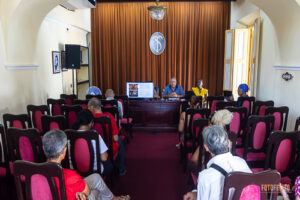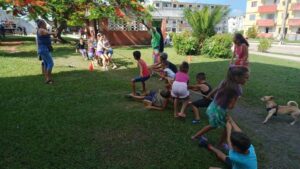Reflection on telecommuting and teleworking: is it possible or not today?


The President of the Republic of Cuba has said that «we must evaluate proposals for working at home and teleworking», because remote work offers advantages for everyone by allowing workers to adapt to the schedule that suits them best without leaving home and without affecting their salary. «It is a perfect combination of work and family life,» said the Cuban Minister of Labour and Social Security, Marta Elena Feitó.
It should be noted, gratia argüendi, that in view of the need to regulate the particularities of teleworking and telecommuting, with the aim of promoting their application, by virtue of the social and economic advantages of the worker carrying out their usual work outside the physical environment of their entity, Resolution No. 71/2021 of the Minister of Labour and Social Security was issued, published in the Official Gazette No. 72 Extraordinary of August 18th, 2021.
It should be noted that the results of the research carried out at the request of the Minister of Labour and Social Security of the Republic of Cuba, through the Technical Advisory Committee of the Ministry of Labour and Social Security, which is part of the Scientific Research Project of the University of Havana (UH) entitled «Design of a socio-psychological intervention model to increase the organisational effectiveness of Cuban companies», headed by the Faculty of Psychology, whose research was supported by the Faculty of Industrial Engineering of the CUJAE, were used to prepare these regulations.
The results of this research certified the relevance of teleworking and telecommuting as forms of work organisation, their greater application and, consequently, the need to establish specific regulations governing their proper implementation.
The above explained has an undeniable reinforcement in the provisions of Decree-Law No. 370 of the Council of State of the Republic of Cuba, «On the informatisation of society in Cuba», dated December 17th 2018. 370 of the Council of State of the Republic of Cuba, «On the computerisation of society in Cuba», of December 17th 2018, when in its Article 59, paragraph c) establishes that, the Ministries of Communications and Labour and Social Security, in accordance with their functions, develop actions aimed at developing telework, in coordination with the other bodies and agencies of the Central Administration of the State and with Resolution 391, of 14th, December 2020, issued by the Minister of Finance and Prices, which regulates the change of physical location of a Tangible Fixed Asset, to be used outside the entity, under the application of the modalities of teleworking and telecommuting.
In the aforementioned Regulation, the scope of application of these forms of work organisation is specified, conceptualising each of them, determining the elements to be included, in each case, in the employment contract or in the supplement signed by the parties, as appropriate, as well as establishing the obligations of the parties in relation to the fulfilment of the agreed tasks, deadlines, terms of delivery and their control.
It is ratified that the workers who work under these modalities are subject to compliance with the labour and safety legislation in force and are entitled to the same rights and duties as the rest of the workers of the entity or institution in which they work in a physical manner, in the centre and in particular, it is established that they receive the same remuneration as the latter, according to the form and system of payment approved in the entity or institution.
The above-mentioned regulation is one of the outputs of the Project on promotion and access to quality jobs, of the Decent Work Programme, derived from the Macro-Programme on Human Development, Equity and Social Justice, which is implemented in Cuba as part of the process of updating our economic and social model.
In line with what has been explained, it is appropriate to point out that recently the decision taken by the delegates of the 110th International Labour Conference (ILC) on 10 June 2022, is considered historic because it commits the ILO member states, including Cuba, to respect and promote the fundamental right to a safe and healthy working environment, whether or not they have ratified the corresponding Conventions at the individual level, which binds them to comply with it regardless of their degree of economic development.
This new right, as a fifth right, is added to the pre-existing rights:
Freedom of association and the effective recognition of the right to collective bargaining.
The elimination of all forms of forced or compulsory labour.
The effective abolition of child labour.
The elimination of discrimination in respect of employment and occupation.
These were the four historical categories of Fundamental Principles and Rights at Work. They were adopted as guiding principles in 1998 and form part of the ILO Declaration on Fundamental Principles and Rights at Work. Respect for and promotion of the fundamental right to a safe and healthy working environment has now been added as a fifth category of these Principles.
The ILO’s recognition of this fifth principle on safe and healthy work has undoubtedly followed the course charted for ensuring decent work and the social and solidarity economy globally.
Final considerations:
– It is necessary to proscribe the attachment to archaic conceptions and methods in matters of Labour Law, because if there are due conditions and agreements between employers and employees in employment contracts, nothing prevents the establishment of the non-physical presence of the contracted worker, with the use of the formulas of telework and remote work, because with this nothing is violated and absences, long and complex transfers, late arrivals, waste of the day, inconvenience… are avoided.
– These methods of carrying out effective work are defended because it is a reality that the physical presence of the worker is not always synonymous with compliance and also because the new times require the application of innovative, advanced ideas.
– It is necessary to regulate the peculiarities of teleworking and remote working, with the aim of promoting their application, by virtue of the social and economic advantages that they mean for the worker to carry out his or her usual work outside the physical environment of his or her organisation.
– Work at home and teleworking, well structured and with the due control of their contents and results, offer advantages for everyone by allowing the worker to adapt to the timetable that best suits him/her without leaving home and without affecting his/her salary, achieving without a doubt a perfect combination between work and family life.
– Telecommuting and teleworking undoubtedly contribute to occupational safety and health and are ostensibly linked to the recent pronouncement by delegates to the 110th International Labour Conference (ILC) on 10 June 2022 that the ILO (International Labour Organisation) recognises occupational safety and health (OSH) as its fifth fundamental principle and right.
Written by Doctor Osvaldo M. Álvarez Torres Consulting Professor. University of Matanzas




